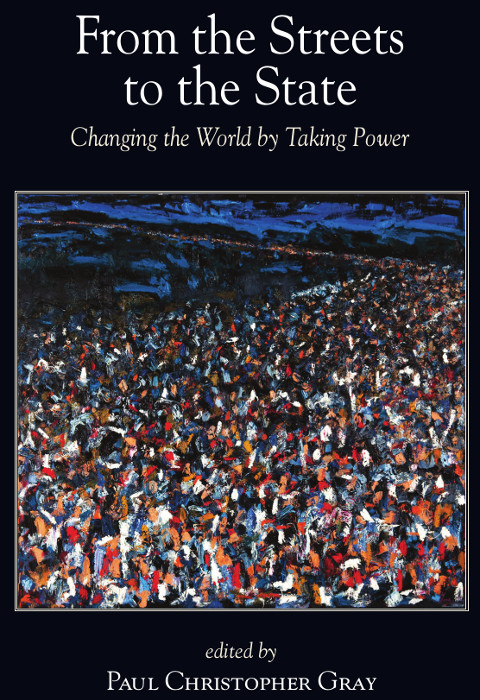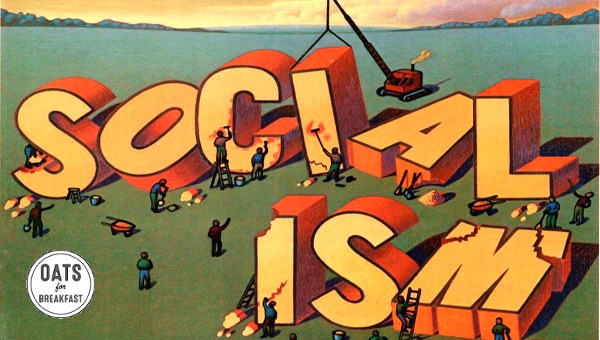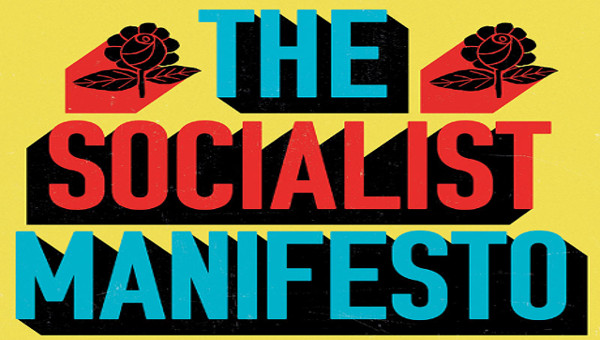«— The State and Socialist Strategy 4 —»
Transforming Capitalist Power: From the Streets to the State
The communist playwright Bertolt Brecht once wrote, “The individual can be annihilated/But the Party cannot be annihilated” (1977, 29). And yet, in the neoliberal era, the Party has been annihilated – only the individual remains. Or so it seemed until a few years ago. Communist parties have become insignificant political forces, or, as in China, are establishing capitalism. Meanwhile, social democratic parties everywhere have abandoned any attempt to achieve socialism through gradual reforms. At the most, they are resigned to preserving a more humane capitalism the permanence of which they do not doubt. Furthermore, for significant parts of the radical left, these experiences of ‘state socialism’ have not discredited the need for an alternative to capitalism, only the idea that it can be achieved through taking state power. For them, the annihilation of the Party is not an obstacle, but an opportunity. This strategy persuaded many within the ‘New Left’ and the ‘new social movements’ since the late 1960s; the anti-globalization, alter-globalization, or global justice movements from the 1990s; the World Social Forums since the early 2000s; and the ‘Occupy’ and ‘Squares’ movements from the late 2000s and early 2010s. The spirit of this diverse political tendency is best captured by the radical left theorist John Holloway and his slogan, ‘Change the world without taking power’ (2010). Since 2015, however, much of the radical left has given renewed prominence to participation within, and debates about, political parties, electoral politics, and taking state power.
 This shift has occurred for various reasons. The 2015 election of Syriza in Greece, so far the only radical left party to be elected to national government since the financial crisis of 2007-8, inspired much optimism, and then provoked much consternation as it sacrificed much of its programme and party vitality with its increasing co-optation into the institutions of the Greek state and the European Union. A similar dynamic has occurred with the election of Jeremy Corbyn to the leadership of the Labour Party, who has put democratic socialism on the agenda in the U.K., but has become mired in immense difficulties navigating potential exit from the Eurozone. The new radical left parties in Spain, Portugal, and Germany confront these issues while also debating whether to join coalitional governments in order to temper the austerity with which their parties might then become associated (Lafrance and Príncipe 2018). The new radical left party in Turkey, the Halkların Demokratik Partisi (People’s Democratic Party), has, despite the Erdoğan government’s repression, achieved considerable electoral victories, but its increasing influence relative to the local neighbourhood assemblies, from which the party emerged, creates tensions throughout these allied institutions (Yörük 2018). The left governments in Latin America, and, in particular, the ‘21st century socialism’ of Chavismo in Venezuela, face familiarly 20th century challenges with the ebbing of the Pink Tide through complex combinations of internal shortcomings, defeats, and outright coups (Chiasson-LeBel 2018). In the U.S., the candidacy of Bernie Sanders fostered dramatic increases in the membership of the Democratic Socialists of America, but, in the midst of its modest electoral successes, there are fraught discussions about how they should relate both to those self-described democratic socialists elected in the Democratic Party and to that party as a whole.
This shift has occurred for various reasons. The 2015 election of Syriza in Greece, so far the only radical left party to be elected to national government since the financial crisis of 2007-8, inspired much optimism, and then provoked much consternation as it sacrificed much of its programme and party vitality with its increasing co-optation into the institutions of the Greek state and the European Union. A similar dynamic has occurred with the election of Jeremy Corbyn to the leadership of the Labour Party, who has put democratic socialism on the agenda in the U.K., but has become mired in immense difficulties navigating potential exit from the Eurozone. The new radical left parties in Spain, Portugal, and Germany confront these issues while also debating whether to join coalitional governments in order to temper the austerity with which their parties might then become associated (Lafrance and Príncipe 2018). The new radical left party in Turkey, the Halkların Demokratik Partisi (People’s Democratic Party), has, despite the Erdoğan government’s repression, achieved considerable electoral victories, but its increasing influence relative to the local neighbourhood assemblies, from which the party emerged, creates tensions throughout these allied institutions (Yörük 2018). The left governments in Latin America, and, in particular, the ‘21st century socialism’ of Chavismo in Venezuela, face familiarly 20th century challenges with the ebbing of the Pink Tide through complex combinations of internal shortcomings, defeats, and outright coups (Chiasson-LeBel 2018). In the U.S., the candidacy of Bernie Sanders fostered dramatic increases in the membership of the Democratic Socialists of America, but, in the midst of its modest electoral successes, there are fraught discussions about how they should relate both to those self-described democratic socialists elected in the Democratic Party and to that party as a whole.
These developments have revitalized debates about political parties and the capitalist state. Widespread rejections of the political party as a form of organization are often based on the optimistic assertion that, in the age of globalization, nation-states and national struggles are of diminishing importance. Those who espouse, ‘Think globally, act locally,’ correctly expose the constraints on democratic spaces imposed by international institutions, trade agreements, currency zones, and new forms of imperialism. Nevertheless, nation-states are not superseded by globalization; rather, they facilitate it (Panitch 1994, 63). The prevalent depictions of globalizing capitalism as ‘post-industrial’ or ‘post-materialist’ attempt to transcend in thought the social relations we have been unable to transcend in practice. The recent waves of technological and social innovations are staggering, but they remain developments within capitalism (Albo 2007, 12). An eroding collective memory and the obsession with academic novelty tend to neglect the extent of historical continuity in our era. Indeed, the only things new under the sun are the carbon emissions that disastrously trap its rays.
An aspect of this continuity is that contemporary debates about parties and the state often feature tensions between two broad tendencies that have divided the radical left throughout the history of its resistance to capitalism. We can describe these two long-standing tendencies as ‘parliamentarism’ and ‘extra-parliamentarism.’
On the one hand, for the parliamentarist tendency, to the extent that the state is democratic, it embodies universal liberties, not the power of the capitalist class and elite groups. This tendency argues that the radical left can use this state to fully realize these liberties in ways that preserve the continuity between the partial democracy permitted under capitalism and the full democracy allowed by socialism. For the parliamentarist tendency, the most important factor is a sufficiently strong and long-lasting governing majority that can fundamentally transform the hindrances to full democracy in civil society. Nevertheless, the parliamentarist tendency, historically exemplified by the social democrats, has been completely absorbed by the state. It can reform capitalism, but not transform it.
On the other hand, the extra-parliamentarist tendency believes that even the most democratic of states is essentially controlled by the capitalist class and ruling groups. Therefore, instead of attempting to win the already existing state-power, this tendency builds alternative institutions in its shadows. Rather than being co-opted into the inferior forms of merely representative democracy, it attempts to create qualitatively different forms of participatory, deliberative, and direct democracy. Ultimately, this tendency envisions long preparations for what will be a sudden and total break with capitalist institutions, whether their goal is violently ‘smashing’ the state, mass withdrawals from the state through actions like prolonged general strikes, or some combination of both. Those in the former sub-tendency, exemplified by the Leninist and Maoist communist parties, have typically remained dependent on, and lacked real control over, the state they have ‘conquered.’ Thus, they resort to recruiting the former state officials and administrators of the ruling classes. This, among other causes, has meant that they tend to replace the capitalist state with a command economy that is just as undemocratic, if not more so. Those in the latter sub-tendency are exemplified by some anarchist currents and more recently by the ‘anti-power’ politics that seeks to change the world without taking power. They altogether refuse to operate on the terrain of the state, which, when it can no longer ignore them, easily crushes them. Despite all of their differences, these two sub-tendencies meet a similar fate. They can oppose capitalism, but not transcend it.1
A purely extra-parliamentary politics has proven as unable to challenge capitalism from outside of the state as is any predominantly parliamentary politics from the inside. Indeed, it has been the case historically that both of these tendencies have not sufficiently heeded each other’s critiques, bending the stick so far in their own directions that they turn it into a dull boomerang capable only of glancing the arguments of the other side before returning to their own. Surely, this is the most narcissistic of weapons.
In what follows, I will first discuss the shortcomings of purely extra-parliamentary politics. Then I will explore the flaws of the narrowly parliamentarist approach. Finally, I will introduce some of the general issues of how to begin reconciling the best aspects of both of these equally one-sided tendencies.

The Limits of Extra-Parliamentarism and ‘Dual Power’
In general, the extra-parliamentarist tendency on the radical left argues that founding an egalitarian society requires creating and expanding institutions that are ‘autonomous’ from the states that they will eventually replace. These parallel institutions include popular assemblies, cooperatives, ‘free zones,’ ‘social centres,’ councils in workplaces, schools, barracks, and neighbourhoods, and in the Leninist and Maoist traditions, political parties that are skeptical of taking elected office in any circumstances that do not provide a reasonable prospect for a total rupture from capitalism. In this essay, I will refer to these currents as the ‘dual power’ strategy (Lenin 1970), although they have also been described as ‘counter-power,’ ‘diarchy,’ or ‘autonomism.’ There are several, likely insurmountable practical problems for dual power strategies. These problems will arise for extra-parliamentarists whether they seek to ‘smash’ the state or to ‘exodus’ from it.
Those who espouse the dual power strategy often treat it as a general model that is applicable to every capitalist country. But when genuinely autonomous institutions have actually competed with their national states for political legitimacy and sovereignty, it has been under the most exceptional and temporary circumstances. It occurs amid defeat in war, as was the case for the Paris Commune, Russian Soviets, and the councils in post-WWI Germany and Austro-Hungary, or defeat in colonial war, as was the case for Portugal in the 1970s. It also arises in response to direct attacks by fascist forces, as with Spain in the 1930s. In all of these cases, parliamentary institutions were non-existent or much weaker and more corrupt than is typical (Sirianni 1983, 91-8; Bensaid 2007). In every other case, autonomous institutions have been tolerated by the central state because they exist in single neighborhoods or in rurally isolated areas that do not directly encroach upon its power, as is true of the significant achievements of the Zapatistas. To paraphrase Wainwright, there is a lot of autonomy on the margins (2006, 52).
Beyond these rare cases, dual power organizations are confined to local levels and limited scales. The bulk of their activities have been focused on supervising governmental agencies and providing basic necessities, such as food, fuel, and housing. Where they have grown beyond local levels and when they are established in more urban, populous, and politically central locations, they are short-lived. Therefore, these parallel institutions do not last long enough to show the majority of people that they are a legitimate alternative to the claim to sovereignty by the national state. While the case of the Russian Soviets before the Bolsheviks took power is an important inspiration for projects to develop dual power, it is even more exceptional. It was aided by the collapse of Russia’s outdated state, its relative isolation from the rest of Europe, and the length of time that its dual power organizations lasted, which was comparatively lengthy, but still less than a year (Sirianni 1983, 109-10; 117). Although there has been a widespread erosion of parliamentary institutions and practices since the 1970s (Mair 2013), even if similar conditions emerge again, there are other profound obstacles to dual power strategies.
The most frequent criticism of attempts to build parallel institutions is that, wherever they gain much significance, they will face constant state repression (Bensaid 2006, 10; Callinicos 2006, 63-4). This not only includes outright coercion. It also has more subtle forms. Agencies comprised of volunteers who deliver important services like health and education are harassed by the state over things like licensing. To be clear, this problem is not unique to the extra-parliamentarist tendency, as is shown by the 1973 coup against Salvador Allende’s parliamentary socialism in Chile. The point is that the proposed alternatives to political parties, such as unions, workers’ councils, and neighbourhood councils, have often benefitted from the election of sympathetic political parties, which have a better chance of holding back the coercive state apparatuses and creating supportive legislation (Sirianni 1983, 111-3). Nevertheless, even if state repression is somehow overcome, there are a number of other significant shortcomings to dual power strategies.
If parallel institutions grow beyond the local scale they could not mobilize the resources necessary to meet society-wide needs. Consequently, these institutions would face permanent fiscal crisis. Governments will not grant taxation powers to organizations that are not connected to existing state institutions. Furthermore, it would be impossible to organize a disciplined withdrawal from tax-collection, not only because this would be difficult to coordinate, but also due to widespread fears of interrupting the public services upon which workers, the poor, and the marginalized especially depend. Furthermore, it would be quite difficult for dual power institutions to coordinate and fund their activities beyond local scales for an extended period of time. Among other things, they would have to contend with elected municipal governments that control services above the local level and are backed by fiscal reserves from provincial, state, and national governments (Sirianni 1983, 112-4; Albo 2007).
This proved difficult even in Red Vienna in the 1920-30s and Red Bologna in the 1970s, where a variety of councils were supported by radical left municipal governments. For example, when Bologna dramatically expanded schooling and established parent-teacher councils, the central government in Rome interfered by allocating a mere 25 teachers for its afternoon schools in 1972-3 compared to the 2,000 it sent to Milan in 1974 (Jäggi, Müller, and Schmid 1977, 124). Furthermore, some radical left governments have provided conditional institutional and financial support to civic initiatives like councils and services while also prioritizing their autonomy, even from these left governments themselves. Take, for example, the ways in which the Australian ‘femocrats’ in the 1970s and the Greater London Council in the 1980s supported and greatly expanded women-led childcare cooperatives and rape crisis centres (Findlay 2018; Wainwright 2018).
Any attempt to fundamentally transform capitalist society also needs to form alliances with state workers, especially the front-line providers of public services (Therborn 1978, 279-30). But attempts to create dual power institutions on large scales will not win support from otherwise sympathetic state workers. Since their jobs depend on the public sector, they “would support the democratization of administrative apparatuses, but hardly their decomposition” (Sirianni 1983, 114). It is not merely that disaffected state workers are capable of wide-ranging sabotage of revolutionary efforts. More importantly, public sector unions can also be positive, active participants in democratizing state structures and empowering egalitarian social movement and labour movement organizations. This is possible even in some of the more coercive institutions of the state. For example, Toronto immigration officers in the late 1980s who were fed up with the lousy services they were forced to provide, formed coalitions with immigrant rights groups, and, in coordination with them, engaged in a work-to-rule campaign for more resources, boycotted overtime and excessive caseloads, and dealt only with those clients who could be reasonably seen during the working day. The joint picket-lines of these producers and users of public services garnered such significant community support that the government was forced to respond by hiring 280 new immigration officers (McElligott 2018). Indeed, establishing councils between the producers and users of public goods would go beyond specific reforms and begin to transform the state.
Another reason why alliances must be formed with state workers is that dual power institutions have never managed highly integrated and complex administrative systems above local scales. The knowledge necessary to plan and run industry on national scales cannot be cultivated merely through improvisation (Sirianni 1983, 118). Furthermore, a sum of autonomous institutions linked by a system of mandates likely cannot develop a ‘collective will,’ a spirit of compromise within the bounds of a generally recognized solidarity. For example, during popular participation in urban planning, if a town opposes having a waste collection centre that they would rather pass off to their neighbours, this will require some form of centralized arbitration to distribute benefits and burdens between legitimate interests (Bensaid 2007). Indeed, this would be crucial for, among other things, ending the environmental racism that locates undesirable facilities in racialized communities.
During the crucial early period of any revolutionary transition, it is likely that there would need to be in place an already existing nation-wide infrastructure. This long-term and widespread cultivation of democratic capacities, of both the skill and the will, is crucial not only to prevent major societal disorganization and disintegration. It is also necessary to account for the fact that, when dual power institutions reach a certain scale, they have often prioritized their own survival and become quite competitive with each other. Take, for example, the Russian case: “the soviet system was continually plagued by problems with credentials, forged mandates, co-optation of outsiders into executive organs, violation of formal divisions of authority, highly uneven representation due to the lack of consistent formal regulations, and the disproportionate influence of the more powerful, strategically located, or politically favored factories, unions, garrisons, and local soviet bodies” (Sirianni 1983, 104-5). In other similar cases of dual power, such as the Spartacists in Germany, the Confederación Nacional del Trabajo in Spain, and the Hungarian council government, these problems occurred to the extent that they attempted to displace the existing state institutions. During revolutionary transitions, this often provoked attempts to counter the widespread disorganization and competition through authoritarian centralization (Sirianni 1983, 106-7; 117-8). Thus, autonomous institutions are susceptible to becoming precisely that which they intend to avoid.
These are some of the major problems that will confront any attempt to change the world without taking power or by ‘smashing’ power. Although the state cannot be thought of as an instrument that lays ready to hand, there is some truth in Louis Blanc’s refrain, “Not to use it as an instrument is to encounter it as an obstacle” (1964, 232). The risks of potential co-optation inherent to the struggle for public office are profound, but they entail fewer difficulties than altogether refusing to operate on the terrain of the state. This attempt to cut the Gordian Knot forgets that the state holds the sword. It substitutes an impossible strategy for one that is merely excruciatingly difficult.
Even if dual power strategies face insurmountable challenges, however, we must also admit that socialist political parties have often become thoroughly absorbed by the state. Before we can attempt to reconcile the salvageable aspects of both the parliamentarist and extra-parliamentarist tendencies, we must first detail the shortcomings of previous strategies for changing the world by taking state power.
The Limits of Parliamentarism and the ‘Social Democratic Trap’
 Many on the radical left reject parliamentary politics because they believe that it will inevitably lead to what is called the ‘social democratic trap.’ In general, this is the idea that, when socialist parties achieve political power during periods of social crisis, their attempts to transform capitalist society through the state often do little more than improve living conditions under capitalism. When leftist governments fail to transition from reform to revolution, they fall into the social democratic trap by “carrying out ‘better than the right’ the same policies as the right” (Gorz 1968, 114). Ultimately, these socialist governments save capitalism from itself.
Many on the radical left reject parliamentary politics because they believe that it will inevitably lead to what is called the ‘social democratic trap.’ In general, this is the idea that, when socialist parties achieve political power during periods of social crisis, their attempts to transform capitalist society through the state often do little more than improve living conditions under capitalism. When leftist governments fail to transition from reform to revolution, they fall into the social democratic trap by “carrying out ‘better than the right’ the same policies as the right” (Gorz 1968, 114). Ultimately, these socialist governments save capitalism from itself.
The misgivings of many radical leftists are certainly warranted. The parliamentarist tendency, throughout its history, has been regularly co-opted into the standard practices of state institutions. Amid the onset of WWI, the socialist parties of the Second International did not call for proletarian solidarity and revolution across nations, but rather, voted to support their respective countries in the hostilities. In the post-WWII era, social democratic parties suppressed their members’ militant struggles and demands for greater popular control of workplaces and banking institutions. Most recently, the Syriza government in Greece accepted the austerity memorandum of the European ‘Troika’ (the European Commission, the European Central Bank, and the International Monetary Fund) despite the unprecedented opposition in the national referendum of July, 2015.
Indeed, the parliamentarist tendency has fallen into this social democratic trap so often that we cannot explain it merely as the betrayal of socialism by individual socialists. Neither can we explain it simply in terms of an abstract ‘institutional logic’ of the state.2 We should critique ‘functionalist’ theories that argue that state actors pursue specific policies and strategies because the state’s function is to reproduce society as a whole. This is circular reasoning. These explanations argue that the capitalist state promotes certain policies because they functionally reproduce capitalist society, and that these policies functionally reproduce capitalism because they are supported by what is obviously a capitalist state. This is not particularly illuminating. Every state action that does not lead to the total collapse of capitalism is deemed functional to capitalism (Albo and Jenson 1989, 209, n. 55). Instead, our explanations must strike the right balance between, on the one hand, the systemic obstacles to transforming capitalist society, and on the other hand, the failure of socialist strategies to sufficiently account and prepare for these obstacles amid circumstances over which we have had some control.
In the standard liberal theories, modern society is comprised of a plurality of interests between which the state is a more or less neutral arbiter. If the government tends to favour certain interests more than others, it is because they have organized into interest-groups capable of mobilizing the citizens, resources, and practices necessary to influence government. Conversely, the best critical theories of society and the state contend that capitalism is the scene of systemic inequalities between different classes and groups (Clarke 1991; Aronowitz and Bratsis 2002). Ours is a capitalist society because a minority of people, the capitalist class, has private ownership and control over ‘capital,’ the property necessary for production, including the land, worksites, instruments, materials, financial assets, and labour-power. The capitalist class also attempts to maintain its rule through mutually reinforcing alliances with those privileged groups whose power is based on co-constituting forms of oppression, including patriarchy, homophobia, transphobia, ableism, racialization, ethnic persecution, colonialism, and imperialism (Bannerji 1995; Ferguson 2016). Furthermore, this ruling bloc absorbs and cultivates ‘representatives’ and ‘leaders’ from the upper strata of oppressed groups. For these reasons, the government is not simply a state in capitalism, but rather, is a capitalist state. It is systemically biased toward the capitalist class and allied elites.
The capitalist state has three levels of bias (Wright 1994, 93). Each successive level is an ever deeper trench by which the ruling class defends its control over the state. It is only when democratic socialist governments and movements begin to traverse the final trench that we will have any chance of fundamentally transforming capitalist society. Until that point, no matter how profound our achievements, we remain within a capitalist state.
The first level of bias is interpersonal. Most state officials come from the capitalist class or have been recruited and educated by its organizations: the private schools, the exclusive clubs, the corporate boards, and the galas. Therefore, state officials tend to share social networks and worldviews. Whereas the children of the working class are raised, in the ruling class they are groomed.
The second level of bias in the capitalist state is institutional. Getting elected and influencing those who have been elected typically require significant resources, institutional connections, and the insider’s knowledge of state structures and governmental practices. Given that the capitalist class has private control of productive property, they and their allies tend to have more of these than other groups. This includes the think tanks, the expert advisors, the electoral machines, the elite lawyers, the seasoned lobbyists, the senior bureaucrats, and the opulent fundraisers. As Levins and Lewontin note, “Hundred-dollar-a-plate dinners sustain the body politic, not the body physical” (1985, 262). Indeed, that figure, laughable by today’s standards, would have to be adjusted not only for inflation but also for the ever higher concentration of wealth.
The interpersonal and institutional levels of bias within the capitalist state are significant, but they cannot sufficiently explain the social democratic trap. For this, we must turn to the final trench. The third level of bias in the capitalist state is systemic. In order to continually reproduce itself, the state requires tax-revenues. These are derived from incomes, which depend on continuing investment and economic growth. Since the capitalist class controls most economic production as their own private-property, they are free to refrain from investing when they deem the circumstances unprofitable, unpredictable, or politically unpalatable. When a government attempts reforms that encroach upon the power of the capitalist classes, they often respond with ‘capital strikes,’ the refusal to reinvest profits in continuing and expanding production. They also engage in ‘capital flight’ by pulling their financial resources out of the country and reinvesting them elsewhere. This lack of private investment by the capitalist class reduces economic growth, incomes, and tax-revenues, which thereby hinders the ongoing activities of government. That is why, systemically, the state is a capitalist state.
This is the paradox of socialist governments in capitalist states. Socialist parties are typically brought to power by alliances within and beyond the working classes between the exploited and the oppressed. These socialist governments initiate their promised reforms, such as expanding redistributive measures and the welfare state; affirmative action and other equity policies; environmental regulations; nationalization of strategic economic sectors; extending public control of financial institutions; and so on. Then, the capitalist class reacts with, among other counter-measures, investment strikes and capital flight. This reduces the funds by which socialist governments can implement their programmes and provokes society-wide economic downturns and crises that hurt those with the least resources. When these burdens become too much to bear, the diverse constituencies of workers and their allies vote their own parties out of office (Bowles, Edwards, and Roosevelt 2005, 521-3). Socialist parties have often stumbled upon the first two trenches of the capitalist state, but for socialist governments, the third trench, which is by far the deepest, is the classic source of the social democratic trap.
Any democratic socialist government must recognize from the outset that, because productive property is privately-owned, substantive reforms will necessarily provoke confrontations with the capitalist class and economic crises. Governments can pressure capitalist enterprises, but cannot force them to invest against their interests. It is impossible to transform capitalism while cooperating fully with it (Panitch 1986, 79). If radical left governments are unable or unwilling to follow through with the conflicts that their initial successes will inevitably ignite, they will create their own obstacles (Gorz 1968, 118). Therefore, democratic socialist parties and movements must campaign for government office by explicitly promoting their intentions to use these crises to extend and deepen democratic institutions and practices in the economy and broader society. When corporations engage in investment strikes and capital flight, they annul their responsibilities over the economic production upon which the whole society depends to meet our needs. Among other things, this justifies bringing that otherwise unused productive property under the public control, and more importantly, the democratic control of workers and their communities.
The only way to traverse the third trench is through simultaneous challenges to the multiple sources of power of the capitalist classes and ruling groups. This not only requires democratic transformations of the state through which they wield political coercion. We must also confront their systemic sources of power in other significant social spheres, including our families, communities, and economies. In particular, it requires challenging their private ownership of productive property through which they wield economic coercion against a state even when they do not directly control it as the ruling political parties. We cannot defer a strategy for appropriating and democratizing privately-owned productive property. It must inform our practice from the very beginning because transforming the systemic biases of the state will require not merely parallel, but interconnected transformations in the state and in the broader society.
Despite the disagreements between the extra-parliamentarist critics and the parliamentarist supporters of taking power, both tend to conflate it with taking office. For example, when Holloway (2010) asserts that we should ‘change the world without taking power,’ he does not explain what is entailed by taking power as distinct from merely taking office. Therefore, he does not establish the strongest possible argument for his opponents’ theory before trying to refute it. What, then, is the distinction between taking office and taking power? Whereas taking office only surmounts the interpersonal and institutional biases of the state, taking power begins to transform its systemic bias. This requires a series of interconnected democratizations in both the state and in the broader society. Otherwise, the lack of it in one realm will leave a bastion of strength from which ruling classes can ultimately stifle it in the others. It is not that we must move from the streets to the state, but that our movements must extend from the streets to the state. This is why we must try to reconcile the best aspects of both the parliamentarist and extra-parliamentarist tendencies.
In, Against, and Beyond the Capitalist State
 Since we must challenge the ruling classes and groups on various fronts, both in the state and in their manifold sources of power in the realms of social reproduction, production, and culture, the radical left cannot simply bring together the extra-parliamentary and parliamentary tendencies. We must genuinely reconcile them. If parties and movements remain satisfied with tenuous balances between these two tendencies, there will be a lack of mutual transformations and their extra-parliamentary and parliamentary wings will persist in their equally one-sided tendencies.
Since we must challenge the ruling classes and groups on various fronts, both in the state and in their manifold sources of power in the realms of social reproduction, production, and culture, the radical left cannot simply bring together the extra-parliamentary and parliamentary tendencies. We must genuinely reconcile them. If parties and movements remain satisfied with tenuous balances between these two tendencies, there will be a lack of mutual transformations and their extra-parliamentary and parliamentary wings will persist in their equally one-sided tendencies.
On the one hand, the extra-parliamentary wing will likely fail to develop the influence and the democratic mechanisms within the political party that are necessary to check those party leaders and members who would attempt to take government office in premature, opportunistic, or strategically problematic ways. Furthermore, they will likely remain detached from political activities within state institutions, which can perpetuate a moralizing purity that condemns as co-optation any of the party’s maneuvers and compromises, even those that genuinely pave the way for further democratizations. Finally, there will not be enough actively engaged party members who remain outside of the state offices and ensure that the party and the affiliated organizations have a life independent of the government (Akuno 2018). Therefore, the extra-parliamentary wing will not become, as Lafrance and Príncipe (2018) put it, a ‘loyal opposition’ to the party-in-the-state. They will be unable to push those party-members who are the elected officials, advisors, administrators, and state workers toward ever greater democratizations of the state.
On the other hand, the parliamentary wing will likely become distant from their allies in the party and the movements as well as from their broader constituencies. Their positions within the party will strengthen, making it unbalanced, because they hold the promise of getting elected, and thus, access to state resources and influence. This can only intensify the myopia of those within the state who are constantly attempting to navigate the institutional balance of forces, make principled compromises, engage in necessary ‘horse-trading,’ and win the crucial votes. Since the parliamentary wing will be those who most frequently and directly interact with state officials, unless there are counterweights within their own party and affiliated organizations, they are likely to be increasingly influenced by this governing elite. Indeed, they will begin to listen to the state administrators and advisors who say, “Wonderful, Minister, you’re putting all this Party thing behind you, and really working for the Department – that’s so fine of you” (Crossman 1972, 63). As they narrow their horizons, they could begin orienting the party toward a ‘national interest’ above the struggles between classes and social groups. Consequently, they will tend to prioritize ‘moderation’ and social harmony rather than the agonistic social conflicts that are necessary for egalitarian change. Furthermore, they will tend to accept the existing structures of the state, overemphasize parliamentary debates and timetables, and focus mobilizations around the next election (Panitch 1986, 92).
All of this will perpetuate the divisions of labour between, on the one hand, the parliamentary organizations of the party, and on the other hand, their allied organizations in the egalitarian labour movements and social movements. Struggles in workplaces, communities, and families will not be politicized in ways that can transcend their fragmentation, and indeed, their sectionalism. Meanwhile, government reforms will be achieved through elite-power brokerage in bureaucratic, legal, or parliamentary back-channels. This stifles attempts to bridge these divides by opening the conceptualization, deliberation, and implementation of radical reforms to a more active popular control in ways that develop our democratic capacities (Magri 1970, 116; 127-8; Hammond 1988, 259-60; Panitch, 1986, 64). Indeed, we must go beyond a more equal balancing between the extra-parliamentarist and parliamentarist tendencies, which, “in practice, might boil down to a compromise between ‘below’ and ‘above’ – in other words, crude lobbying by the former of the latter, which is left intact” (Bensaid 2007). Mutual transformations toward a more collective will and common strategy require the interpenetration of these elements.
We are in the wake of two successive eras from which emerged two different forms of political organization, neither of which have proven adequate. The ‘industrial age,’ which gave us Lenin’s ‘party of iron,’ was pervaded by these metallic metaphors, including Goethe’s ‘great, eternal iron laws’; Marx’s ‘iron laws of history’; Lassalle’s ‘iron law of wages’; Bismarck’s ‘through blood and iron’; Weber’s ‘iron cage’; and, of course, Michels’ ‘iron law of oligarchy.’ Conversely, the fluidity of our so-called ‘post-industrial age’ is saturated with a more liquid language, including Berman’s ‘perilous flow of modernity,’ which floods into Foucault’s post-modern preference for ‘flows over unities’; Barthes’ ‘power flows’; Deleuze and Guattari’s ‘economy of flows’; Castells’ ‘spaces of flows’; Leitch’s ‘local effects and global flows’; and Hardt and Negri’s ‘global informational flows.’ This culminates in Holloway’s praise for anti-power politics as the “social flow of doing” (2010, 28). With a mere diversity of strategies devoid of genuine reconciliation, however, the hierarchy of The Party and the horizontalism of the Movement of Movements sit uneasily beside each other. Instead of a genuine synthesis between the best aspects of both, this only builds the solid structures of the ‘party of iron’ in the dynamic current of the ‘flow of doing.’ But then the structure corrodes and collapses into water that has become too toxic to nourish. This combines the worst of both worlds.
For the kind of politics that can reconcile the best aspects of the extra-parliamentary and parliamentary tendencies, we can look to campaigns for free and accessible mass transit. These campaigns can unite diverse groups in common struggle, especially those who are most dependent on public transit, including women, people of colour, youth and the elderly, people with disabilities, and workers. Furthermore, since mass public transit is much more energy-efficient and ecologically sustainable than many other forms of travel, it is crucial for the collective issue of our time, climate change. Indeed, because these campaigns require a broad range of knowledge, skills, and actions, they will result not in a diversity of tactics, as it is sometimes called, but in a disparity of tactics, unless they are connected to a broader political strategy. Otherwise, establishing mass transit could have unintended consequences, such as gentrification. Therefore, these campaigns need to go beyond attempts to address the overlapping interests of a broad and diverse patchwork of groups. Rather, the strategy must be even more co-constituting than the many oppressions against which we struggle. Identifying and combatting not only each and every oppression but also their dynamic enmeshing and blending is the condition of overcoming all oppression. Free and accessible mass transit will also strengthen and expand the public sector. Eliminating transit fares removes the policing-function of transit workers and shifts public services from disciplining users toward providing for social needs. Furthermore, these campaigns could foster councils between the providers and users of public services, between the unions of transit operators and transit riders, thereby bridging the struggles of social movements, labour movements, and state workers.
In fact, these kinds of political strategies not only offer a tangible and relatively immediate campaign, but if the dramatic expansion of public goods is combined with the democratization of their production, distribution, and consumption, they also point toward longer-term goals and strategies. For example, when Lisbon transit workers went on strike, instead of withholding their labour, they refused to accept fares. This ‘good work strike’ not only put financial pressure on their government employer, but also won the support of the public who relied on the service. Indeed, these transit workers offered a glimpse of a totally de-commodified future, a vision of transcending capitalism and the state. Furthermore, developing mass public transit will not only require progressive taxes, but also industrial strategies based on the ‘green transition’ of our economies. The scale of these transformations demands political parties in government with mandates to nationalize and democratize key industries and financial institutions. This could expand public participation in the economy through long-term planning mechanisms that are based on collaborations between public banks and enterprise boards. For example, certain regions could convert their declining automobile industries toward producing mass transit infrastructures and vehicles. This will bring sustainable and socially-useful jobs to areas devastated by de-industrialization and high unemployment, including those places that have become the focus of far-right, xenophobic movements and parties. Finally, egalitarian attempts to win and fundamentally transform state power are likely premature unless there have also been massive campaigns for workers’ control in order to develop the capacities, strategic relationships, and confidence necessary to democratize production on a mass-scale.3
We should be equally wary of the conviction that ‘The Party cannot be annihilated, only the individual can be annihilated,’ and the aspiration for ‘More than a movement, but less than a party.’ Network politics, coalition-building, and a movement of movements are as one-sided as is any party that would attempt to become the only significant base of struggle. Nevertheless, if the fundamental transformation and transcendence of capitalist society must occur not wholly, but substantively, in, against, and beyond the state, how can we develop a democratic socialist politics that has a strategy for preventing co-optation into government institutions and ruling classes? The mutually transformative collaborations between the new radical left parties and the egalitarian social movements demonstrate what our principle could be: More than a movement, more than a party. •
Bibliography
- Akuno, Kali. (2018). Casting Shadows: Chokwe Lumumba and the Struggle for Racial Justice and Economic Democracy in Jackson, Mississippi. In Paul Christopher Gray (Ed.), From the Streets to the State: Changing the World by Taking Power. New York: State University of New York Press.
- Albo, Greg. (2007). “The Limits of Eco-Localism: Scale, Strategy, Socialism.” In Leo Panitch & Colin Leys (Eds.), Coming to Terms with Nature: Socialist Register 2007. London: Merlin Press.
- Albo, Greg & Jenson, Jane. (1989). A Contested Concept: The Relative Autonomy of the State. In Wallace Clement & Glen Williams (Eds.), The New Canadian Political Economy. Montreal: McGill-Queen’s University Press.
- Aronowitz, Stanley & Bratsis, Peter (Eds.). (2002). Paradigm Lost: State Theory Reconsidered. Minneapolis: University of Minnesota Press.
- Bannerji, Himani. (1995). Thinking Through: Essays on Feminism, Marxism and Anti-Racism. Toronto: Women’s Press.
- Bensaid, Daniel. (2006). On a Recent Book by John Holloway. In International Institute for Research and Education (Eds.), Change the World without Taking Power?…or…Take Power to Change the World? A Debate on Strategies on how to Build Another World … Amsterdam: IIRE. Retrieved from web.archive.org.
- Bensaid, Daniel. (2007, January 4). The return of strategy. International Socialism 113. Retrieved from isj.org.uk.
- Blanc, Louis. (1964). Organization of Labor (1848). In Albert Fried and Ronald Sanders (Eds.), Socialist Thought: A Documentary History. Garden City, New York: Anchor Books.
- Bowles, Samuel, Edwards, Richard & Roosevelt, Frank. (2005). Understanding Capitalism: Competition, Command, and Change, 3rd Ed. New York: Oxford University Press.
- Brecht, Bertolt. (1977). The Measures Taken and other Lehrstücke. London: Eyre Methuen.
- Callinicos, Alex. (2006). A Debate between John Holloway and Alex Callinicos: ‘Can we change the world without taking power?’ In International Institute for Research and Education (Eds.), Change the World without Taking Power?…or…Take Power to Change the World? A Debate on Strategies on how to Build Another World … Amsterdam: IIRE. Retrieved from web.archive.org.
- Chiasson-LeBel. (2018). Watching over the Right to Turn Left: The Limits of State Autonomy in Pink Tide Venezuela and Ecuador. In Paul Christopher Gray (Ed.), From the Streets to the State: Changing the World by Taking Power. New York: State University of New York Press.
- Clarke, Simon (Ed.). (1991). The State Debate. New York: St. Martin’s Press.
- Costello, Nicholas, Michie, Jonathan, & Milne, Seumas. (1989). Beyond the Casino Economy: Panning for the 1990s. London: Verso.
- Crossman, Richard H. S. (1972). The Myths of Cabinet Government. Cambridge, Massachusetts: Harvard University Press.
- Eley, Geoff. (2002). Forging Democracy: The History of the Left in Europe, 1850-2000. New York: Oxford University Press, Inc.
- Ferguson, Susan. 2016. “Intersectionality and Social-Reproduction Feminisms: Toward an Integrative Ontology.” Historical Materialism 24:38–60.
- Findlay, Tammy. (2018). Femocratic Administration and the Politics of Transformation. In Paul Christopher Gray (Ed.), From the Streets to the State: Changing the World by Taking Power. New York: State University of New York Press.
- Geras, Norman. (1985). The Legacy of Rosa Luxemburg. London: Verso.
- Gorz, Andre. (1968). “Reform and Revolution.” In Ralph Miliband and Ralph Saville (Eds.), Socialist Register 1968. London: Merlin Press.
- Hammond, John L. (1988). Building Popular Power: Workers’ and Neighborhood Movements in the Portuguese Revolution. New York: Monthly Review Press.
- Holloway, John. (2010). Change the World Without Taking Power, 2nd ed. London: Pluto Press.
- Jäggi, Max, Müller, Roger & Schmid, Sil. (1977). Red Bologna. London: Writers and Readers Publishing Cooperative (Society Limited).
- Lafrance, Xavier and Catarina Príncipe. (2018). Building “Parties of a New Type”: A Comparative Analysis of New Radical Left Parties in Western Europe. In Paul Christopher Gray (Ed.), From the Streets to the State: Changing the World by Taking Power. New York: State University of New York Press.
- Lenin, V. I. (1970). The Dual Power. In Selected Works: Volume Two. Moscow: Progress Publishers.
- Levins, Richard & Lewontin, Richard. (1985). The Dialectical Biologist. Cambridge, Massachusetts: Harvard University Press.
- Luxemburg, Rosa. (2004). The Russian Revolution. In Peter Hudis and Kevin B. Anderson (Eds.), The Rosa Luxemburg Reader. New York: Monthly Review Press.
- Magri, Lucio. (1970, March-April). Problems of the Marxist Theory of the Revolutionary Party. New Left Review, I/60: 97-128.
- Mair, Peter. (2013). Ruling the Void: The Hollowing of Western Democracy. New York: Verso.
- McElligott, Greg. (2018). Beyond Service, beyond Coercion? Prisoner Co-ops and the Path to Democratic Administration. In Paul Christopher Gray (Ed.), From the Streets to the State: Changing the World by Taking Power. New York: State University of New York Press.
- Panitch, Leo. (1986). “The Impasse of Social Democratic Politics.” In Ralph Miliband, John Saville, Marcel Liebman, and Leo Panitch (Eds.), Socialist Register 1985/86: Social Democracy and After. London: The Merlin Press.
- Panitch, Leo. (1994). “Globalisation and the State.” In Ralph Miliband and Leo Panitch (Eds.), In Between Globalism and Nationalism: Socialist Register 1994. London: Merlin Press.
- Sirianni, Carmen. (1983, September). Councils and Parliaments: The Problems of Dual Power and Democracy in Comparative Perspective. Politics & Society 12: 83-123.
- Sitrin, Marina and Dario Azzellini. (2014). They Can’t Represent Us! Reinventing Democracy from Greece to Occupy. London: Verso.
- Socialist Project. (2013). Free Transit. Winnipeg, Manitoba: Open Door Press.
- Stanford, Jim. (1999). Paper Boom: Why Real Prosperity Requires a New Approach to Canada’s Economy. Ottawa, Ontario: The Canadian Centre for Policy Alternatives and James Lorimer and Co. Ltd.
- Therborn, Goran. (1978). What Does the Ruling Class Do When it Rules? State Apparatuses and State Power under Feudalism, Capitalism and Socialism. London: NLB.
- Wainwright, Hilary. (2006). Response to John Holloway. In International Institute for Research and Education (Eds.), Change the World without Taking Power?…or…Take Power to Change the World? A Debate on Strategies on how to Build Another World … Amsterdam: IIRE. Retrieved from web.archive.org.
- Wainwright, Hilary. (2018). Forging a “Social Knowledge Economy”: Transformative Collaborations between Radical Left Governments, State Workers, and Solidarity Economies. In Paul Christopher Gray (Ed.), From the Streets to the State: Changing the World by Taking Power. New York: State University of New York Press.
- Wright, Erik Olin. (1994). Interrogating Inequality: Essays on Class Analysis, Socialism and Marxism. New York: Verso.
- Yörük, Erdem. (2018). The Radical Democracy of the People’s Democratic Party: Transforming the Turkish State. In Paul Christopher Gray (Ed.), From the Streets to the State: Changing the World by Taking Power. New York: State University of New York Press.
This essay is a shorter, updated version of my introduction to the recent edited volume, From the Streets to the State: Changing the World by Taking Power (State University of New York Press, 2018).
Endnotes
- This paragraph is influenced by Luxemburg 2004, 301-8 and the analysis in Geras 1985, 133-93.
- For example, this is the kind of explanation often offered by Sitrin and Azzellini (2014).
- This example is inspired by an actual campaign (Socialist Project 2013) as well as by Costello et al. 1989, 255-61 and Stanford 1999, 397-402.





